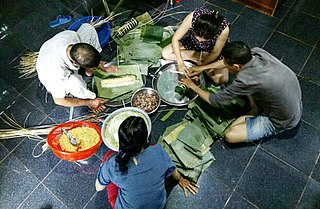
Tết, short for Tết Nguyên Đán, is the most important celebration in Vietnamese culture. Tết celebrates the arrival of spring based on the Vietnamese calendar and usually has the date in January or February in the Gregorian calendar.

Trịnh Công Sơn was a Vietnamese musician, songwriter, painter and poet. He is widely considered to be Vietnam's best songwriter. His music explores themes of love, loss, and anti-war sentiments during the Vietnam War, for which he was censored by both the southern Republic of Vietnam and the Socialist Republic of Vietnam. Many performing artists, most notably Khánh Ly, Trinh Vinh Trinh, and some overseas singers such as Tuan Ngoc, Le Quyen, Le Thu, and Ngoc Lan, have gained popularity in their own right from covering Trịnh's songs.
In general, a Vietnamese pronoun can serve as a noun phrase. In Vietnamese, a pronoun usually connotes a degree of family relationship or kinship. In polite speech, the aspect of kinship terminology is used when referring to oneself, the audience, or a third party. These terms may vary by region. Many are derived from Chinese loanwords but have acquired the additional grammatical function of being pronouns.
Yu is the pinyin romanisation of several Chinese family names. However, in the Wade–Giles romanisation system, Yu is equivalent to You in pinyin. "Yu" may represent many different Chinese characters, including 余, 于, 由, 魚 (鱼), 漁(渔), 楀, 俞(兪), 喻, 於, 遇, 虞, 郁, 尉, 禹, 游, 尤, 庾, 娛(娱), and 茹 (Rú).
Đỗ is a Vietnamese family name. According to Lê Trung Hoa, a Vietnamese scholar, approximately 1.4 percent of Vietnamese people have this surname (2005).

Phung is a Vietnamese surname. The name is transliterated as Feng in Chinese and Pung in Korean. The word Phung without the accent is also a Chinese surname Péng (彭), usually found in Southeast Asia.

Ruan is a Chinese surname.
Vietnamese is an analytic language, meaning it conveys grammatical information primarily through combinations of words as opposed to suffixes. The basic word order is subject-verb-object (SVO), but utterances may be restructured so as to be topic-prominent. Vietnamese also has verb serialization. In sentences, the head of the phrase usually precedes its complements, nouns are classified according to series of lexical parameters, and pronouns may be absent from utterances. Question words in the language do not exhibit wh-movement.
Trịnh is a Vietnamese family name. It exists in equivalent forms in other languages of the Sinosphere such as in Chinese and Korean.

Ning is the romanisation of the Chinese surnames 寧 Níng and its variant 甯 Nìng. After the introduction of simplified characters, both names were written as 宁 in Mainland China until 2000, when the character 甯 was restored as an accepted variant for people whose family had originally used that character. However, usage of 甯 remains rare, with most continuing to use 宁.

Bùi is a common Vietnamese surname, ranked 9th among the most common surnames in Vietnam. The surname Pei (裴) in Chinese and Bae (배) in Korean share the same origin with it.
Dinh (丁) is a Vietnamese surname. In Vietnam, the surname is spelled Đinh or Đình, but the latter is very rare in Vietnamese.
Tôn Thất is a two-character Vietnamese compound surname, originating from the Nguyễn dynasty. It is the surname for members of the imperial family that were not direct first-born descendants of the Emperor, and therefore considered collateral relatives of the Nguyễn dynasty.
Bạch is a Vietnamese language surname, which means "white". The name is transliterated as Bai in Chinese, and as Baek in Korean. Bach may be an anglicized variation of Bạch. The surname may refer to:

Lí is a Chinese surname. It mostly appears in Central and South China where it is transliterated as Lai or Lei.
Tó is a Portuguese nickname. People with this nickname include the following:
Qu. While the character 曲 is often pronounced Qǔ in Modern Mandarin, the surname is pronounced Qū in the first tone. It is written Khúc in Vietnamese.
Pawelek or Pawełek is a surname. Notable people with the surname include:
This page is based on this
Wikipedia article Text is available under the
CC BY-SA 4.0 license; additional terms may apply.
Images, videos and audio are available under their respective licenses.






